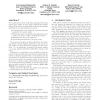Free Online Productivity Tools
i2Speak
i2Symbol
i2OCR
iTex2Img
iWeb2Print
iWeb2Shot
i2Type
iPdf2Split
iPdf2Merge
i2Bopomofo
i2Arabic
i2Style
i2Image
i2PDF
iLatex2Rtf
Sci2ools
133
click to vote
WWW
2005
ACM
2005
ACM
Sampling search-engine results
We consider the problem of efficiently sampling Web search engine query results. In turn, using a small random sample instead of the full set of results leads to efficient approximate algorithms for several applications, such as: ? Determining the set of categories in a given taxonomy spanned by the search results; ? Finding the range of metadata values associated to the result set in order to enable "multi-faceted search;" ? Estimating the size of the result set; ? Data mining associations to the query terms. We present and analyze an efficient algorithm for obtaining uniform random samples applicable to any search engine based on posting lists and document-at-a-time evaluation. (To our knowledge, all popular Web search engines, e.g. Google, Inktomi, AltaVista, AllTheWeb, belong to this class.) Furthermore, our algorithm can be modified to follow the modern object-oriented approach whereby posting lists are viewed as streams equipped with a next method, and the next method ...
Internet Technology | Keywords Search Engines | Popular Web Search | Search Engine Query | WWW 2005 |
| Added | 22 Nov 2009 |
| Updated | 22 Nov 2009 |
| Type | Conference |
| Year | 2005 |
| Where | WWW |
| Authors | Aris Anagnostopoulos, Andrei Z. Broder, David Carmel |
Comments (0)

